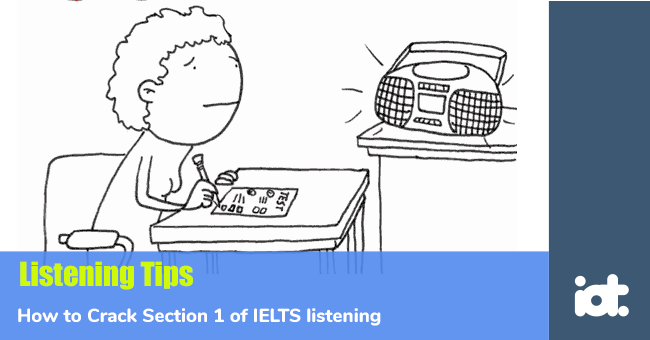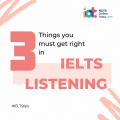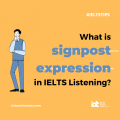IELTS listening section 1 is perhaps the easiest part of IELTS listening exam. The reason is that you have simple questions of form filling or short notes type. If you can get all the ten questions right in this section, it would be quite good for you to boost up your band score in listening module.
Let us find out the strategy you can adopt for section 1 of IELTS listening.
Predict Your Answer
First you should quickly go through all the 10 questions in section 1, to know the kind of blanks the questions have and also, you can predict the answer at the same time. For speculating the answer, you can carefully look at the grammar aspect; whether the answer should be a singular word or plural word, whether a number is asked in the question or it is a word to be written there in the blank.
For example,
First Name ……………… (Answer is a word)
Wage Rate………………. (Answer is a number)
Foreign Accent Pronunciation Matters
Learning foreign accent pronunciation of all the alphabets as well as numbers is highly recommended for clearing this section because it is definitely the case that answers would be spelled by the speakers. Such questions are highly scoring and thus, should not be skipped or missed.
For example,
Postcode …………..WXY702 (Pronunciation of alphabets and numbers)
Phone………………..1654078 (Pronunciation of numbers)
Carefully Finding Answers
In the audio, in section 1, the speaker is very likely to change the answer. So, it’s extremely important that you pay attention to the audio in order to listen it thoroughly. Candidates often make mistake here by listening only the first word and not paying attention to the conversation afterwards. So, keep in mind that you have to quickly write down the answer and listen carefully later on as well to see whether the speaker changes the answer or not.
For example,
Audio Conversation:
Mike: I would like to know the time when you will be available to receive call.
Sara: I am usually available on Monday in the afternoon at 2 pm. Oh wait but this time, I have some work outside the town. So, I would be available on Tuesday.
Question:
Availability: …………………….(TUESDAY is the answer)
Avoid Silly Mistake
Though this is the simplest section in IELTS listening module, students may still make silly mistakes. One of the common mistakes is to write down unit when it is already written in the question or otherwise writing down answer without unit when it is, actually, expected.
For example,
Pay rate: $……….(20 is answer)
Pay rate: …………($20 is answer)
Time: ………..hours (2 or TWO is answer)
Time: ………………..(2 hours or TWO HOURS is answer)



















Comments:
Mashallah Best website that I have ever seen. I would like to suggest every one to visit this website and get much band as they can.
CAN SOMEONE REVIEW MY ESSAY PLEASE
i believe that everyone has different opinions on this topic. But In my opinion, specialised facilities should exist only to train the top atheltes. Yet, the governments still should provide other facilities for everyone else to use, you will never know if someone has a hidden talent and potential but don't know how to improve it beause there is no place to learn. Some people volunteer and build a basketball basket outside of their property just so other kids can play.
On the other hand, countries building specialised facilities for top atheletes is not a terrible thing. People like top atheletes should have a place only for them to train. Because, they can focus and open up their full potential in the place everything they need has provided.
For instance, they still can train at a gym or other not specialised facilites. However, the amount of people around them, the equipments that are not necessary are going to distract them.
Nonetheless, i would say that there are still a plenty of people with hidden potential. Since, in some country there aren't much facilities for the residents (such as training center, public gym) and they are unable to unlock the hidden talent and what they can do. Despite of that, every country should provide their citizen the opportunity to find what their talent its and what they can do for their country. I strongly believe that if the government had already provided this opportunity, a lot of great atheletes would have been born by now.
Excellent attempt indeed.
its very helpful thank you all
MAN THE FIRST LISTENING TEST WAS SO COMPLEX. I HOPE THE REAL TEST IS NOT AS COMPLEX AS THIS
hello my name hoang thanh tam
hi i have one doubt , is these tests are paid or unpaid ?
hope i can pass the IELTS test
I am going to take preparation for IELTS. This website is very helpful for learner. I want to touch with this browser. Thanks a lot .
hello very helpfull website but some where i cant find my test no .
Which leavel is this ?
why the reading test in Practice Test 4 is so difficult for me, anyone has the same opinion?